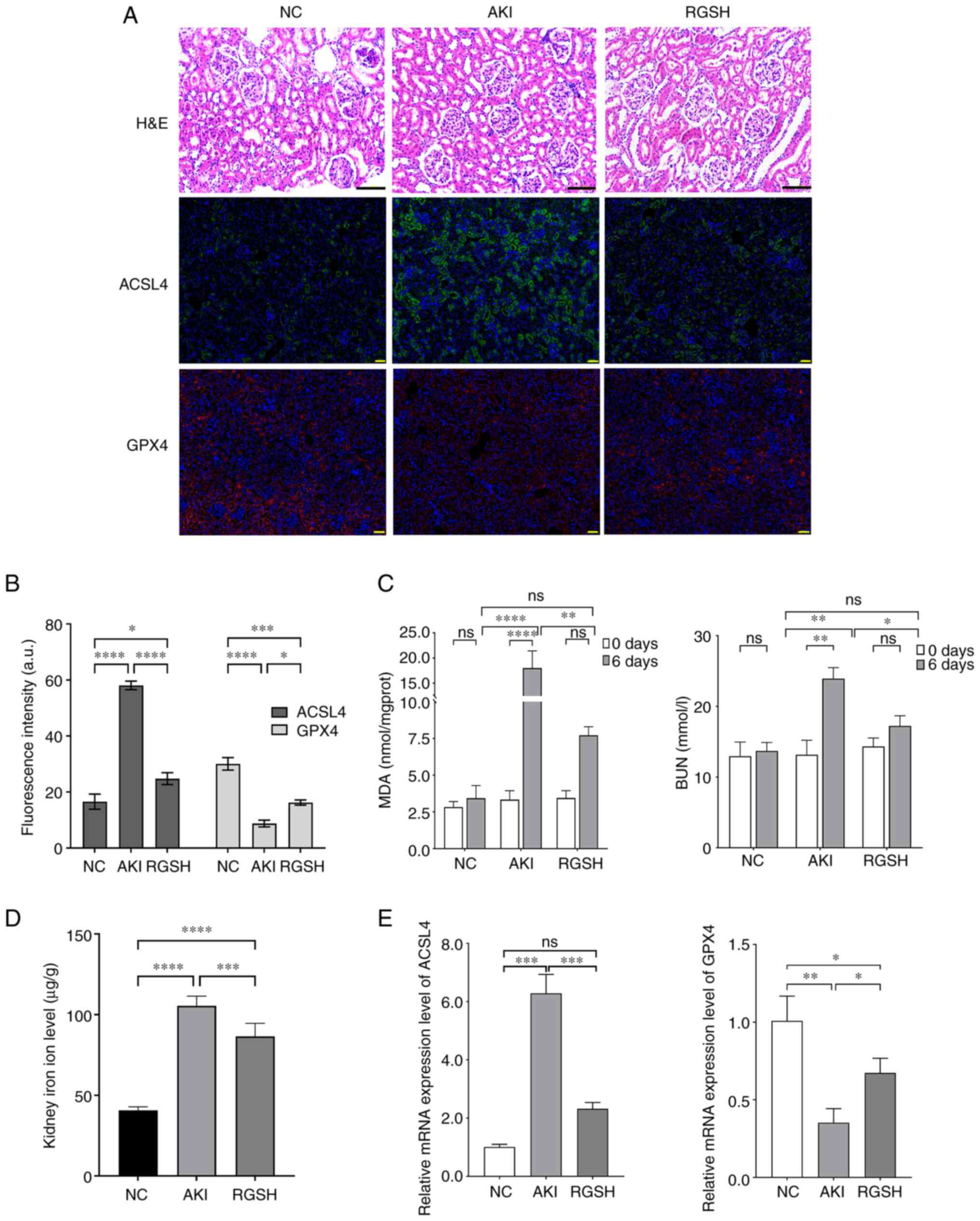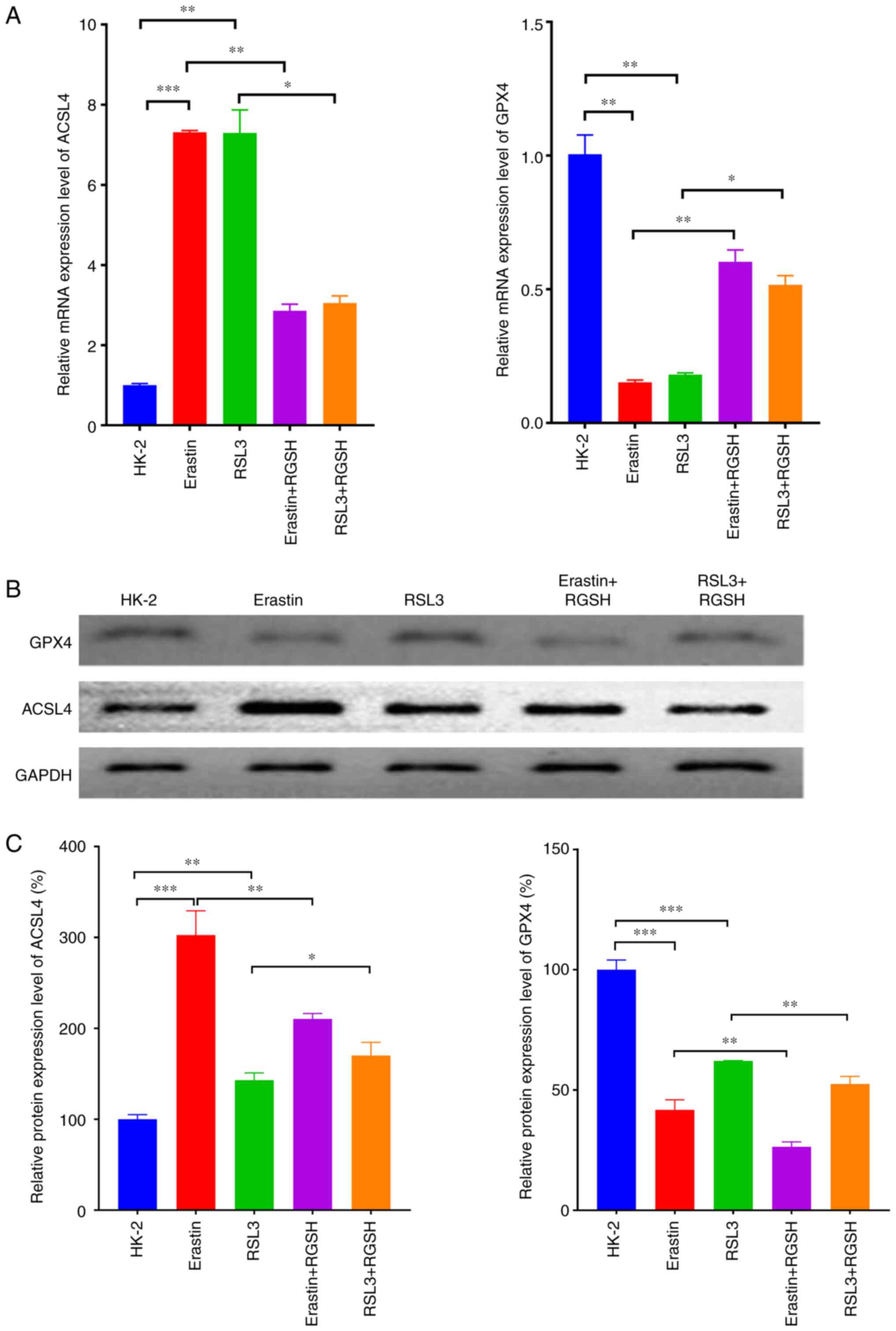|
1
|
Hounkpatin H, Fraser S, Glidewell L,
Blakeman T, Lewington A and Roderick P: Predicting risk of
recurrent acute kidney injury: A systematic review. Nephron.
142:83–90. 2019. View Article : Google Scholar : PubMed/NCBI
|
|
2
|
Saadat-Gilani K and Zarbock A:
Perioperative renal protection. Curr Opin Crit Care. 27:676–685.
2021. View Article : Google Scholar : PubMed/NCBI
|
|
3
|
Calvert S and Shaw A: Perioperative acute
kidney injury. Perioper Med (Lond). 1:62012. View Article : Google Scholar : PubMed/NCBI
|
|
4
|
Singbartl K and Kellum J: AKI in the ICU:
Definition, epidemiology, risk stratification, and outcomes. Kidney
Int. 81:819–825. 2012. View Article : Google Scholar : PubMed/NCBI
|
|
5
|
Sul YH, Lee JY, Kim SH, Ye JB, Lee JS,
Yoon SY and Choi JH: Risk factors for acute kidney injury in
critically ill patients with torso injury: A retrospective
observational single-center study. Medicine (Baltimore).
100:e267232021. View Article : Google Scholar : PubMed/NCBI
|
|
6
|
Dixon S and Stockwell B: The role of iron
and reactive oxygen species in cell death. Nat Chem Biol. 10:9–17.
2014. View Article : Google Scholar : PubMed/NCBI
|
|
7
|
Sha R, Xu Y, Yuan C, Sheng X, Wu Z, Peng
J, Wang Y, Lin Y, Zhou L, Xu S, et al: Predictive and prognostic
impact of ferroptosis-related genes ACSL4 and GPX4 on breast cancer
treated with neoadjuvant chemotherapy. EBioMedicine. 71:1035602021.
View Article : Google Scholar : PubMed/NCBI
|
|
8
|
Carney E: Ferroptotic stress promotes the
AKI to CKD transition. Nat Rev Nephrol. 17:6332021. View Article : Google Scholar : PubMed/NCBI
|
|
9
|
Park EJ, Dusabimana T, Je J, Jeong K, Yun
SP, Kim HJ, Kim H and Park SW: Honokiol protects the kidney from
renal ischemia and reperfusion injury by upregulating the
glutathione biosynthetic enzymes. Biomedicines. 8:3522020.
View Article : Google Scholar : PubMed/NCBI
|
|
10
|
Chen H, Qi Q, Wu N, Wang Y, Feng Q, Jin R
and Jiang L: Aspirin promotes RSL3-induced ferroptosis by
suppressing mTOR/SREBP-1/SCD1-mediated lipogenesis in
PIK3CA-mutatnt colorectal cancer. Redox Biol. 55:1024262022.
View Article : Google Scholar : PubMed/NCBI
|
|
11
|
Xiao MD: J.X: Effect of reduced
glutathione on high glucose-induced reactive oxygen species,
nuclear factor-kappa B andosteopontin in human renal tubular
epithelial cells. Jiangsu Med J. 34:2008.
|
|
12
|
Leary SLU: W.; Anthony, R.; Cartner, S.;
Corey, D.; Grandin, T.; Greenacre, C.; Gwaltney-Bran, S.;
McCrackin, M.; Meyer, R.; Miller, D.; Shearer, J.; Yanong, R.;
Golab, G.;: Patterson-Kane E AVMA guidelines for the euthanasia of
animals: 2013 edition. 2013. https://www.avma.org/KB/Policies/Pages/Euthanasia-Guidelines.aspx
|
|
13
|
Meng XZ: Ni; Zhang, Min; Song, Xuexia;
Liu, Qian; Huang, Xiangyan: Effect of reduced Glutathione onserum
and urinary concentration of NGAL in the rodent model of Cisplatin
induced acute kidney injur. China J Modern Med. 24:2014.
|
|
14
|
Livak KJ and Schmittgen TD: Analysis of
relative gene expression data using real-time quantitative PCR and
the 2(−Delta Delta C(T)) method. Methods. 25:402–408. 2001.
View Article : Google Scholar : PubMed/NCBI
|
|
15
|
Goren O and Matot I: Perioperative acute
kidney injury. Br J Anaesth. 115 (Suppl 2):ii3–ii14. 2015.
View Article : Google Scholar : PubMed/NCBI
|
|
16
|
Kim-Campbell N, Gretchen C, Callaway C,
Felmet K, Kochanek PM, Maul T, Wearden P, Sharma M, Viegas M, Munoz
R, et al: Cell-free plasma hemoglobin and male gender are risk
factors for acute kidney injury in low risk children undergoing
cardiopulmonary bypass. Crit Care Med. 45:e1123–e1130. 2017.
View Article : Google Scholar : PubMed/NCBI
|
|
17
|
Liu D, Zhang C, Hu M and Su K:
Scutellarein relieves the death and inflammation of tubular
epithelial cells in ischemic kidney injury by degradation of COX-2
protein. Int Immunopharmacol. 101:1081932021. View Article : Google Scholar : PubMed/NCBI
|
|
18
|
Lane D, Metselaar B, Greenough M, Bush A
and Ayton S: Ferroptosis and NRF2: An emerging battlefield in the
neurodegeneration of Alzheimer's disease. Essays Biochem.
65:925–940. 2021. View Article : Google Scholar : PubMed/NCBI
|
|
19
|
Xiong R, He R, Liu B, Jiang W, Wang B, Li
N and Geng Q: Ferroptosis: A new promising target for lung cancer
therapy. Oxid Med Cell Longev. 2021:84575212021. View Article : Google Scholar : PubMed/NCBI
|
|
20
|
Li C, Sun G, Chen B, Xu L, Ye Y, He J, Bao
Z, Zhao P, Miao Z, Zhao L, Hu J, You Y, Liu N, Chao H and Ji J:
Nuclear receptor coactivator 4-mediated ferritinophagy contributes
to cerebral ischemia-induced ferroptosis in ischemic stroke.
Pharmacol Res. 174:1059332021. View Article : Google Scholar : PubMed/NCBI
|
|
21
|
Bao Z, Liu Y, Chen B, Miao Z, Tu Y, Li C,
Chao H, Ye Y, Xu X, Sun G, et al: Prokineticin-2 prevents neuronal
cell deaths in a model of traumatic brain injury. Nat Commun.
12:42202021. View Article : Google Scholar : PubMed/NCBI
|
|
22
|
Wang J, Liu Y, Wang Y and Sun L: The
cross-link between ferroptosis and kidney diseases. Oxid Med Cell
Longev. 2021:66548872021.PubMed/NCBI
|
|
23
|
Wang Y, Quan F, Cao Q, Lin Y, Yue C, Bi R,
Cui X, Yang H, Yang Y, Birnbaumer L, et al: Quercetin alleviates
acute kidney injury by inhibiting ferroptosis. J Adv Res.
28:231–243. 2021. View Article : Google Scholar : PubMed/NCBI
|
|
24
|
Martines A, Masereeuw R, Tjalsma H,
Hoenderop J, Wetzels J and Swinkels D: Iron metabolism in the
pathogenesis of iron-induced kidney injury. Nat Rev Nephrol.
9:385–398. 2013. View Article : Google Scholar : PubMed/NCBI
|
|
25
|
Zhao Z, Wu J, Xu H, Zhou C, Han B, Zhu H,
Hu Z, Ma Z, Ming Z, Yao Y, et al: XJB-5-131 inhibited ferroptosis
in tubular epithelial cells after ischemia-reperfusion injury. Cell
Death Dis. 11:6292020. View Article : Google Scholar : PubMed/NCBI
|
|
26
|
Chen C, Wang D, Yu Y, Zhao T, Min N, Wu Y,
Kang L, Zhao Y, Du L, Zhang M, et al: Legumain promotes tubular
ferroptosis by facilitating chaperone-mediated autophagy of GPX4 in
AKI. Cell Death Dis. 12:652021. View Article : Google Scholar : PubMed/NCBI
|
|
27
|
Vairetti M, Di Pasqua L, Cagna M, Richelmi
P, Ferrigno A and Berardo C: Changes in glutathione content in
liver diseases: An update. Antioxidants (Basel). 10:3642021.
View Article : Google Scholar : PubMed/NCBI
|
|
28
|
Santos NA, Bezerra CS, Martins NM, Curti
C, Bianchi ML and Santos AC: Hydroxyl radical scavenger ameliorates
cisplatin-induced nephrotoxicity by preventing oxidative stress,
redox state unbalance, impairment of energetic metabolism and
apoptosis in rat kidney mitochondria. Cancer Chemother Pharmacol.
61:145–155. 2008. View Article : Google Scholar : PubMed/NCBI
|
|
29
|
Han P, Qin Z, Tang J, Xu Z, Li R, Jiang X,
Yang C, Xing Q, Qi X, Tang M, et al: RTA-408 protects kidney from
ischemia-reperfusion injury in mice via activating Nrf2 and
downstream GSH biosynthesis gene. Oxid Med Cell Longev.
2017:76121822017. View Article : Google Scholar : PubMed/NCBI
|
|
30
|
Jia D, Zheng J, Zhou Y, Jia J, Ye X, Zhou
B, Chen X, Mo Y and Wang J: Ferroptosis is involved in hyperoxic
lung injury in neonatal rats. J Inflamm Res. 14:5393–5401. 2021.
View Article : Google Scholar : PubMed/NCBI
|
|
31
|
Zuk A and Bonventre JV: Acute kidney
injury. Annu Rev Med. 67:293–307. 2016. View Article : Google Scholar : PubMed/NCBI
|

















